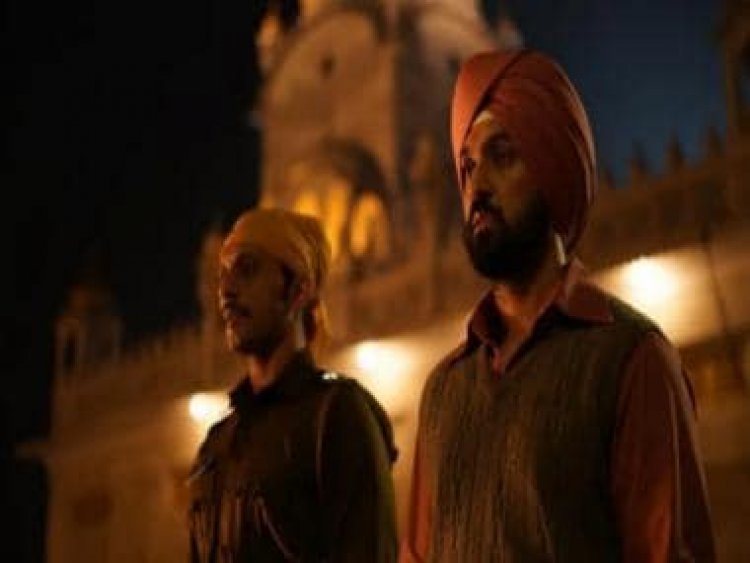How Diljit Dosanjh emerges as a symbol of resistance in Netflix's Jogi
How Diljit Dosanjh emerges as a symbol of resistance in Netflix's Jogi

“Jogi, the whole of Janakpuri is burnt down. They have burnt two gurudwaras, let alone houses!” tells a Sikh man to Jogi who is hiding with his family at Bangla Sahib Gurudwara. “We must fight to protect ourselves,” says a vengeful Jogi who is taken aback by how the whole country has turned against his community in just eight hours. “Are you out of your mind? We are ordinary working men. Not goons,” says a skeptical Sikh man sitting next to him.
“So what do we do then? Wait for them to kill us?” asks Jogi as he sets out on a journey to fight the rioters and in a way, fight the communal hatred and bigotry which led to the Sikh genocide. His journey to resist and fight for survival is not easy. In Jogi, we see a symbol of Resistance who is not afraid to resort to violence when needed but he is also equally compassionate and empathetic when the situation demands it. We see him beat up the guards at the toll booth and lock horns with Lali. But we also see his love for common folk when he stops running in the middle of an attack to save a stranger. Though Jogi loses his innocence and becomes vengeful in his fight for survival, his humanity stays intact.
His love for his family is a driving force which pushes Jogi on the path of Resistance but in the process, he doesn’t wish to abandon his community either. “What about others?”Jogi asks when his police friend, Rawinder, offers to get his family to Punjab. Even though Jogi is acutely aware that the menace he is fighting affects not just him but his community – it is pervasive and transcends the confines of his dinner table where conversations on drinking happen in hushed tones and paranthas are a breakfast-staple.
But Jogi is, after all, a human. We see him break down when he shaves his head at Agrasen ki Baoli. Perhaps, that was when he realized what he was up against. Later, we see his eyes well up when he is forced to burn his house in Trilokpuri – but surprisingly, he doesn’t shed a tear this time. It seems that Jogi has now become accustomed to pain and loss. It’s almost as if he has resigned to fate and made peace with what’s about to come as he continues to fight till his dying breath. His emotions do resurface later – we see him tear up when he begs Lali to not kill his people to settle personal scores. This only shows that despite his godlike fighting spirit, Jogi does feel vulnerable like others around him.
In his Resistance, Yogi often has to walk a tightrope and balance between his urge to fight the bigotry and his love for his community. At one point, Jogi decides to confront Lali, the police officer who exposed his plan to rescue the Sikhs of Trilokpuri. He is stopped by Rawinder, who tells him that doing so would invite trouble for not just him, but his people, especially since Lali knew Rawinder was helping Jogi in his fight. Ultimately, Jogi’s urge to Resist comes with a caveat – he can fight as long as the authorities don’t come for his family and his people. As a result, in this battle between belligerence and love – it is the latter which wins. At one point, Rawinder, too, is miffed and takes offense at Jogi’s idealism – his sheer audacity to fight Lali and hence, Tejpal who are out to get him. Each time Jogi is overpowered by idealism, Rawinder gives him a reality check and reminds him that the odds are not in his favour.
Like most Revolutionary leaders, Jogi, too, has a tragic end. His ideas and spirit to fight bigotry are immortal but Jogi himself is mortal and is killed by Tejpal. Even in his final moments, Jogi is rebellious – he charges at Tejpal and punches him with all his might when he kills one of his kin. Later, when he is shot, he spits on Tejpal’s face as a final act of rebellion.
One can’t help but wonder if Jogi’s Resistance is Resistance or simply his fight for survival? It poses a deeper question if revolutionaries who resist and fight oppression and bigotry are indeed special or their fight, much like the rest of the common folk, is to stay alive? What makes them revolutionaries then? Is it their courage? Or their ideas? Perhaps, it is their love for their community and refusal to abandon their people in times of distress that makes them unique. It is their refusal to run away but instead, fight back when things go South that truly sets them apart from the rest of us.
Jogi, starring Diljit Dosanjh, is streaming on Netflix.
Deepansh Duggal is an entertainment, pop-culture and trends writer based in New Delhi. He specializes in op-eds based on the socio-political and gender issues in the world of entertainment and showbiz. He also writes explainers and occasionally reviews shows in the OTT space. He tweets at @Deepansh75.
Read all the Latest News, Trending News, Cricket News, Bollywood News, India News and Entertainment News here. Follow us on Facebook, Twitter and Instagram.
What's Your Reaction?

























































